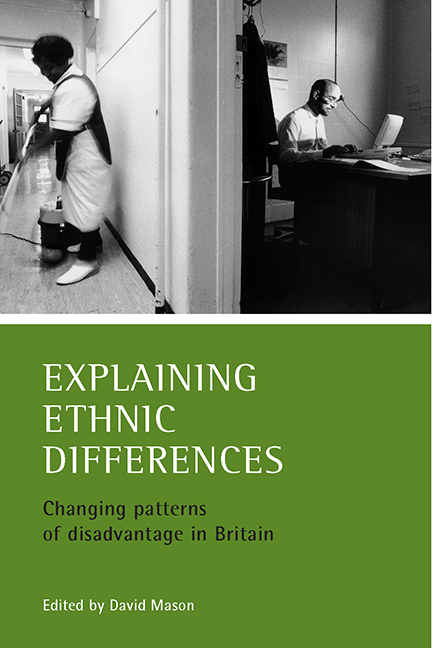Book contents
- Frontmatter
- Contents
- List of figures and tables
- Foreword
- Notes on contributors
- one Introduction
- two Changing ethnic disadvantage: an overview
- three The demographic characteristics of people from minority ethnic groups in Britain
- four Ethnic differentials in educational performance
- five Changing patterns of ethnic disadvantage in employment
- six Patterns of and explanations for ethnic inequalities in health
- seven Housing black and minority ethnic communities: diversity and constraint
- eight ‘All the women are white, all the blacks are men – but some of us are brave’: mapping the consequences of invisibility for black and minority ethnic women in Britain
- nine Police lore and community disorder: diversity in the criminal justice system
- References
- Index
two - Changing ethnic disadvantage: an overview
Published online by Cambridge University Press: 20 January 2022
- Frontmatter
- Contents
- List of figures and tables
- Foreword
- Notes on contributors
- one Introduction
- two Changing ethnic disadvantage: an overview
- three The demographic characteristics of people from minority ethnic groups in Britain
- four Ethnic differentials in educational performance
- five Changing patterns of ethnic disadvantage in employment
- six Patterns of and explanations for ethnic inequalities in health
- seven Housing black and minority ethnic communities: diversity and constraint
- eight ‘All the women are white, all the blacks are men – but some of us are brave’: mapping the consequences of invisibility for black and minority ethnic women in Britain
- nine Police lore and community disorder: diversity in the criminal justice system
- References
- Index
Summary
Background
In this chapter, I aim to set out the context in which we have to understand the apparent increasing diversity of experiences of disadvantage by Britain's minority ethnic communities. In doing so I shall try, so far as is possible, to avoid anticipating too much of the material that is set out in the following chapters. A key underlying assumption of what I have to say is that neither diversity nor variations in the experience of ethnic disadvantage are new. From the outset, the various groups that have come together to constitute the population of Great Britain have had diverse experiences, both of the process of migration and of establishing their places in an increasingly multi-ethnic Britain. The failure to recognise this diversity probably has a number of sources. These include the initially strikingly visible differences between the newcomers and those already resident in Britain (summed up graphically in the title of Sheila Patterson's book Dark strangers [1963]); the adoption for both official and unofficial purposes of the designation ‘immigrant’; and a general ignorance about the countries and locations from which migrants had come. Both the general public and policy makers struggled gradually towards a distinction between African-Caribbeans (often referred to as West Indians) and Asians. Only slowly and uncertainly did recognition emerge that the ‘Asian’ group was not homogeneous, and the significance of different island origins among African-Caribbeans has been all but overlooked.
This is not to say that there are not processes afoot that have made diversity more obvious, nor that there have been no changes in the character and patterning of disadvantage within and between groups. Having said that, the growing consciousness of increasing diversity is a product of a complex of real change, improved data and greater sensitivity to the nuances of ethnic variation. The move away from old assumptions has been greatly facilitated by improved data. Nevertheless, I want to suggest that both past perspectives and the way we are able to grasp the character of current trends are structured by some persistent underlying assumptions about the character of ethnic difference and by our (inherited) categorisation and measurement practices. As a result, even our improved awareness of diversity really only scratches the surface of the real ethnic variety of modern Britain.
- Type
- Chapter
- Information
- Explaining Ethnic DifferencesChanging Patterns of Disadvantage in Britain, pp. 9 - 20Publisher: Bristol University PressPrint publication year: 2003



